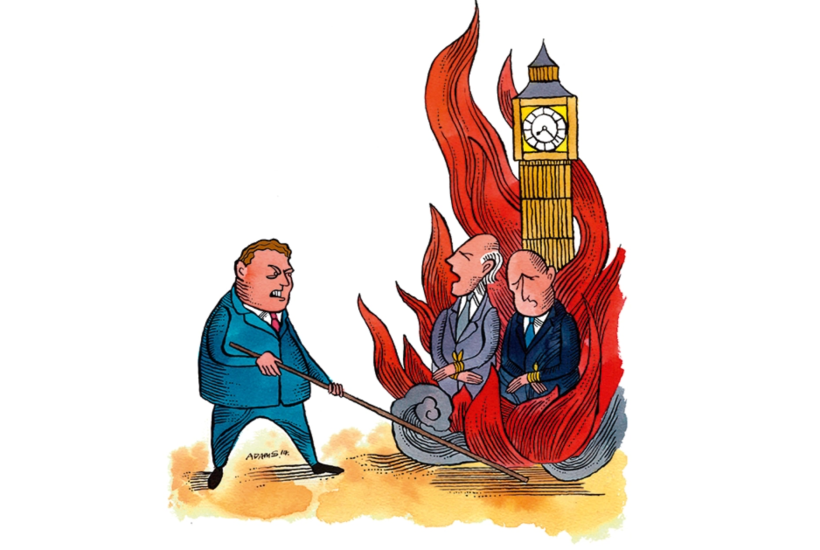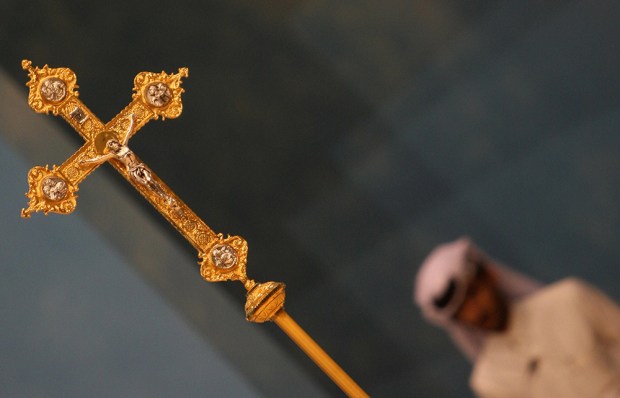Beyond belief
Sir: Tim Farron (‘Church and state’, 25 February) repeats many of the common errors made by those of faith. He starts by equating secularists with atheists, yet they are quite distinct. To be an atheist is simply not to believe in the existence of a God. That’s it. You can be an atheist and almost anything; communist, fascist, socialist, liberal, conservative.
A secularist believes in the separation of church and state, as many people of faith do as well as atheists. This separation is enshrined in the secular US Constitution, in one of the more religious countries in the West. Secularism is actually the only possible guarantor of religious freedom, something Farron says he’s in favour of. Without secularism, religion holds a formal, authoritative role in public life. But they can’t all do that, not least because the major religions are mutually exclusive. If you don’t want secularism, you have to decide which version of which religion shall have a public role, to the necessary exclusion and disadvantage of all the others.
Farron also asserts that without God, human rights are ‘an arbitrary, temporary fiction’. Are atheists intrinsically less moral than believers? The Bible contains much that is moral, and much that is not. Finally, no secularist (or indeed atheist) is suggesting we should all be ‘forced to obey a uniform belief’. It’s religious authorities, when they have the power, that do that.
Jeremy Stocker
Willoughby, Warwickshire
Not liberal or democratic
Sir: In the era of inclusion and diversity, it is deeply worrying to come across the case of a friend of mine who, as the new Liberal Democrat candidate for the winnable Sutton and Cheam, is fighting deselection for being a practising Anglican.
Various linked complaints about him were submitted to the Liberal Democrats and all were dismissed, but the local party remains unswayed. As my friend tells me, the one allegation held over him and which he has not denied is his Christian faith.
The two previous prospective parliamentary candidates in the constituency were Muslim women. I wonder whether the same questions were asked of them in the aggressive way asked of their Christian successor? Are Christians expected to leave their faith and conscience at the door when they enter the party political arena? Tim Farron says they should not, but apparently that is what was demanded, (after a selection conference fairly won) by Sutton Liberal Democrats.
This sort of treatment is neither liberal nor democratic. My friend would make an excellent MP, serving all his constituents without fear or favour, irrespective of any of the divisions much loved by secularists.
The Revd Simon Douglas Lane
Hampton, Middlesex
Call that the arts?
Sir: Jonathan Sumption laments the defunding of opera by Arts Council England (Diary, 25 February); but the Council is pouring money elsewhere. On top of £1 million to the Manchester National Football Museum, and nearly a quarter of a million to the Blackpool Illuminations, ACE will be granting National Portfolio Organisation status and £750,000 to the North Yorkshire Moors (Steam) Railway over the next three years. Having been instructed by the former culture minister Nadine Dorries to shore up the Tory Red Wall, ACE is diverting funds away from opera ‘up north’ into worthy but off-piste ventures that have no obvious kinship with the arts whatsoever.
T. Simon Couzens
Cardiff
Gun money
Sir: No doubt Andrew Roberts is right to say that we should fund replacement and indeed additional heavy guns, as they are clearly needed (‘Spent force’, 25 February). What he doesn’t address is why they cost £10 million each. Does no one question this price tag? As he says himself, these are relatively low-tech pieces of kit. It would help the whole procurement argument if the suppliers were charging reasonable prices, instead of taking advantage of their market position.
David Whitby
Auchencairn, Dumfries and Galloway
Bard reputation
Sir: My gratitude to Douglas Murray for pointing out that Shakespeare fans might be considered radical right-wingers (‘Does anything not count as “far-right” now?’, 25 February). The former dictatorship of my home country would doubtless agree. China enforced a state ban on Shakespeare for the entire Cultural Revolution. However, the Bard was so popular that – as legend has it – queues formed in the streets within hours of Mao’s death for copies of The Merchant of Venice.
Jennifer Zhou
Magdalen College, Oxford
Vermeer’s milk jug
Sir: In an otherwise wonderful piece on Vermeer’s women (Arts, 18 February) Laura Gascoigne is way off the canvas to suggest that the great artist ‘cheated with the milk jug’ in his famous depiction entitled ‘The Milkmaid’ c. 1660. The earthenware pitcher is very large, with a depth and bulbous nature as typical today as in 1660, and could easily contain at least one litre of milk without showing more than a trickle at the spout when so delicately tilted. There may be much allegorical and suggestive imagery in Vermeer’s works, but in this case he painted what he saw. No cheating here.
Christopher Crohill
Coulsdon, Surrey
Dissected by orcas
Sir: Reading ‘Notes on Orcas’ by Simon Barnes (18 February) puts me in mind of the orcas in the waters of Plettenberg Bay in South Africa. There orcas attack and kill great white sharks, whose carcases are washed up largely intact but with liver and heart removed.
P. Heydenrych
Middlewich, Cheshire
Got something to add? Join the discussion and comment below.
Get 10 issues for just $10
Subscribe to The Spectator Australia today for the next 10 magazine issues, plus full online access, for just $10.
You might disagree with half of it, but you’ll enjoy reading all of it. Try your first month for free, then just $2 a week for the remainder of your first year.














Comments
Don't miss out
Join the conversation with other Spectator Australia readers. Subscribe to leave a comment.
SUBSCRIBEAlready a subscriber? Log in